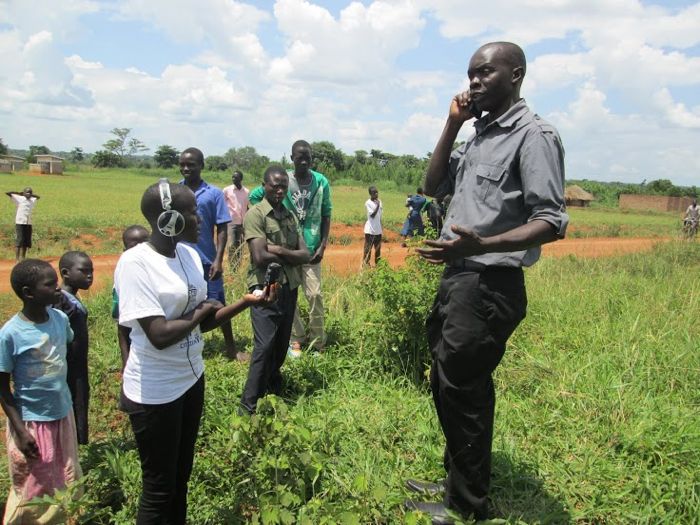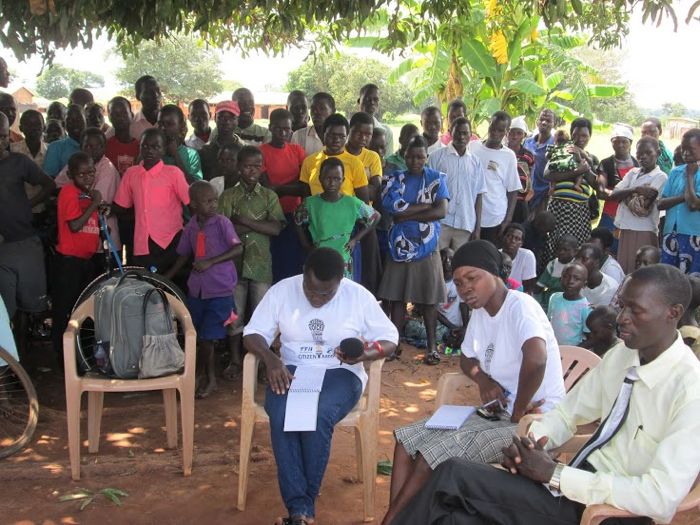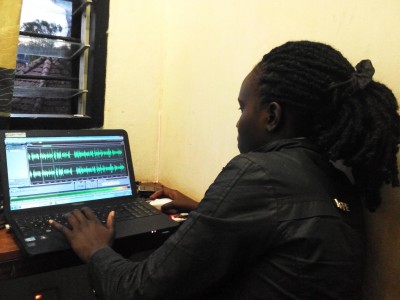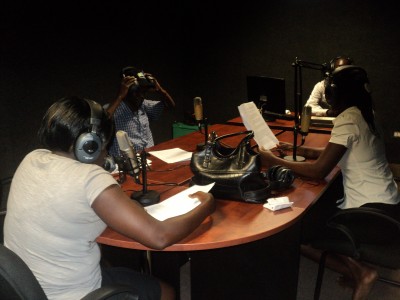Rising Voices Grantee Update

Theatre Technology House field research. Photo by TTH.
After three weeks of pre-implementation events, which included content-generation field research, consultation with different stakeholders on priority areas, sketch mapping of the storyline and identification of information needs, the Theatre Technology House has finally equipped the team that will basic knowledge and skills needed carry out the production of the twelve episodes radio story on social justice, good governance, and effectiveness of electoral democracy.
The two-day training, held on the 18th and 19th of August was conducted by a researcher from Theatre Technology House, Gira Emmanuel and the Radio Soap Production Crew of Radio Wa 89.8 FM, a community Radio where the soap will be aired. In this training, 28 production team members were trained including script writers, directors, and producers, and the volunteer actors and actresses that will produce the Common Community Radio Soap, a digital radio drama which is set to go on air this September 2014.
Stemming from the technical symposium on documentation by the lead team, the training event discussed and analyzed the community views gathered by the research team from the field events carried out in Abongomola and Aduku sub-counties in Apac district. This field research findings informed the programme team on the focus areas that the community thinks are relevant to their needs (the information needs of the common man).

Theatre Technology House community consultation. Photo by TTH.
The citizen’s views captured in the field research helped determine the content of the training. The views included: how democratic election are still elusive like a dream in the common man’s society, suggestions on how the elections can translate into economic prosperity for the community, good health and quality education for all. Whereas the citizens and the conceptual perception is that democracy should be an all-involving and all-beneficial concept, according to the findings, it is a contradiction and popular situation in the ordinary citizen's view that, electoral democracy is aimed at satisfying the needs and interest of the political leaders and their close allies. The social and economic benefits expected in return for the votes are merely words, rather than actions.
People of Abongomola mobilized by Joel Obwolo, a community based journalist and reporter of Radio Wa 89.8 FM shared an insightful illustration of what democracy and good governance means to the ordinary citizen. Using the metaphor of the five senses of a human being, one man said democracy and good governance appeal more to the audio sense, than all the others. Citizens cannot touch, smell, see, or taste it. Democracy only sounds louder, hissing, and irritating and it does not have any meaning to the ordinary citizens. This and many other views helped the research team raise many questions that are being answered by political, economic and governance experts.
Sample questions raised from the findings are:
- How can the ordinary citizen touch, see, taste and smell good governance and democracy?
- Who is responsible for making the common man touch, see, taste and smell good governance and democracy?
- What are the roles and responsibility of the ordinary citizen in ensuring that they touch, see, smell and taste good governance and the fruit of democracy?
- What are the fruits and seeds of good governance and democracy?
How democratic are our elections?
- Are there factors that hinder the common man from making a right decision in the electoral process?
- Can the community, without external influence, decide on the way they can be ruled?
- How can our elections be translated into peace, good health, justice and economic prosperity of our community?
These and more questions and their answers shall be addressed in sequence in the radio soap. The story development and script writing team will use these insights to develop and structure a radio story which will run for four weeks using these contents.


